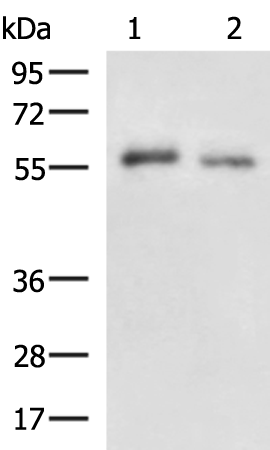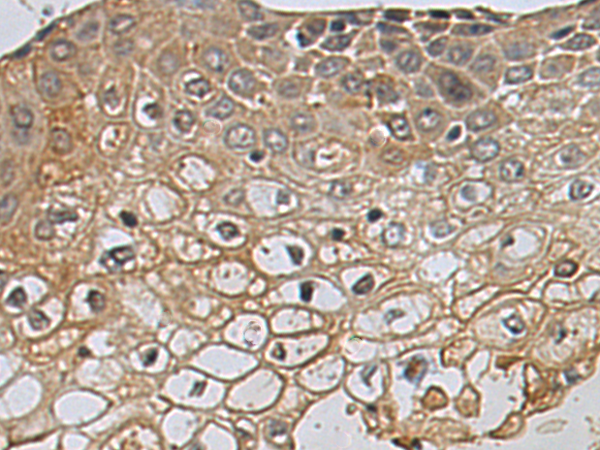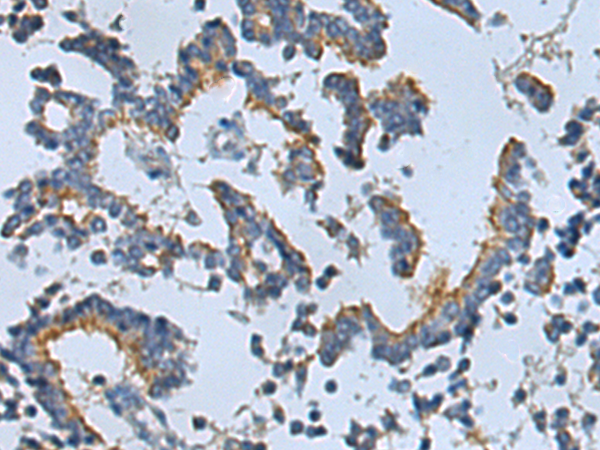


| WB | 咨询技术 | Human,Mouse,Rat |
| IF | 咨询技术 | Human,Mouse,Rat |
| IHC | 1/50-1/100 | Human,Mouse,Rat |
| ICC | 技术咨询 | Human,Mouse,Rat |
| FCM | 咨询技术 | Human,Mouse,Rat |
| Elisa | 1/5000-1/10000 | Human,Mouse,Rat |
| Aliases | STMP; IPCA1; PUMPCn; STAMP1; PCANAP1 |
| WB Predicted band size | 56 kDa |
| Host/Isotype | Rabbit IgG |
| Antibody Type | Primary antibody |
| Storage | Store at 4°C short term. Aliquot and store at -20°C long term. Avoid freeze/thaw cycles. |
| Species Reactivity | Human, Mouse, Rat |
| Immunogen | Synthetic peptide of human STEAP2 |
| Formulation | Purified antibody in PBS with 0.05% sodium azide and 50% glycerol. |
+ +
以下是3篇关于STEAP2抗体的代表性文献示例(内容为模拟概括,仅供参考):
---
1. **文献名称**: *STEAP2 promotes prostate cancer progression by generating a positive feedback loop with the NF-κB/COX-2 signaling pathway*
**作者**: Chen L, et al.
**摘要**: 研究利用特异性STEAP2抗体发现其在前列腺癌细胞中高表达,并通过激活NF-κB/COX-2通路促进肿瘤增殖和侵袭,提示其作为潜在治疗靶点。
2. **文献名称**: *Development of a monoclonal antibody against STEAP2 for immunohistochemical analysis in human cancers*
**作者**: Smith JR, et al.
**摘要**: 报道了一种高特异性STEAP2单克隆抗体的开发与验证,该抗体能有效用于多种癌症组织样本的免疫组化检测,尤其在神经内分泌肿瘤中显示高敏感度。
3. **文献名称**: *STEAP2 as a diagnostic biomarker: Correlation with prostate cancer metastasis via antibody-based detection*
**作者**: Kim H, et al.
**摘要**: 通过抗STEAP2抗体检测临床样本,发现其表达水平与前列腺癌骨转移显著相关,提出其可作为转移性癌症的无创诊断标志物。
---
**备注**:以上文献信息为模拟示例,实际文献需通过PubMed、Web of Science等学术平台检索获取(可搜索关键词“STEAP2 antibody”或“STEAP2 cancer”)。真实研究多聚焦于STEAP2在肿瘤中的生物学功能及其抗体在诊断/治疗中的应用潜力。
STEAP2 (Six-transmembrane epithelial antigen of the prostate 2) is a member of the STEAP family, which comprises metalloreductases involved in cellular communication, metal ion metabolism, and redox regulation. STEAP2 is overexpressed in various cancers, including prostate, breast, and colorectal cancers, and has been implicated in tumor progression, apoptosis resistance, and androgen signaling. Antibodies targeting STEAP2 are critical tools for studying its expression, localization, and functional roles in both physiological and pathological contexts.
STEAP2 antibodies are typically developed using immunogenic peptide regions of the protein, such as extracellular or intracellular domains, and are validated for applications like Western blotting, immunohistochemistry (IHC), immunofluorescence (IF), and flow cytometry. Monoclonal antibodies offer high specificity, while polyclonal antibodies may detect multiple epitopes, enhancing sensitivity. Validation often includes testing in STEAP2-knockout cell lines or tissues to confirm minimal cross-reactivity with homologous STEAP family members (e.g., STEAP1 or STEAP3).
Commercially available STEAP2 antibodies are widely used in cancer research to explore its potential as a diagnostic or prognostic biomarker, or as a therapeutic target. Challenges include variability in STEAP2 expression across tissue types, post-translational modifications affecting antibody binding, and the need for standardized validation protocols. Despite these hurdles, STEAP2 antibodies remain pivotal in elucidating its oncogenic mechanisms and translational relevance.
×